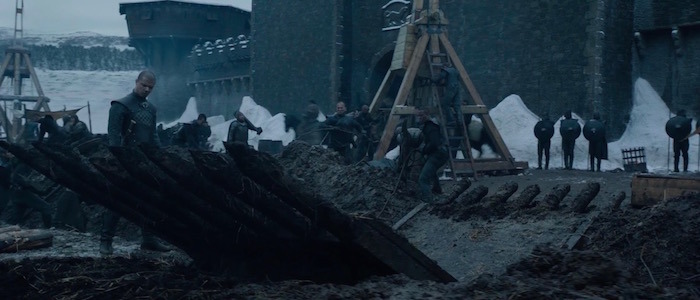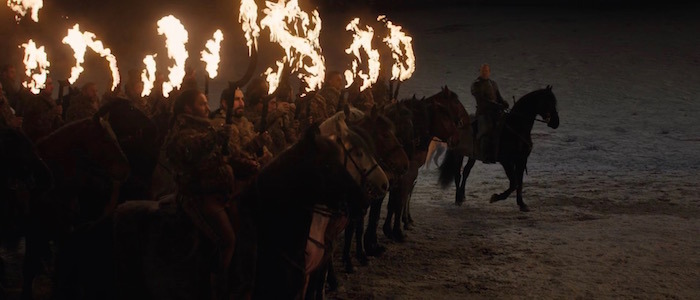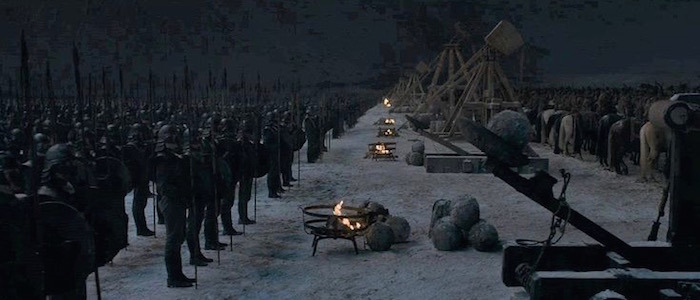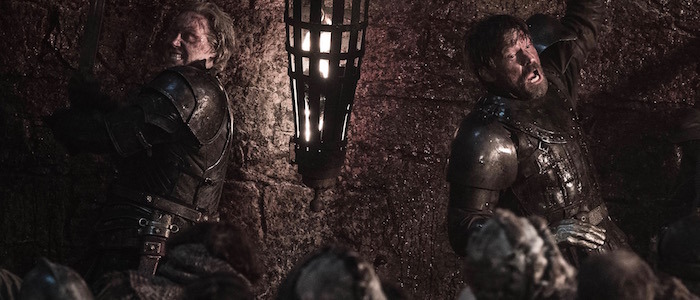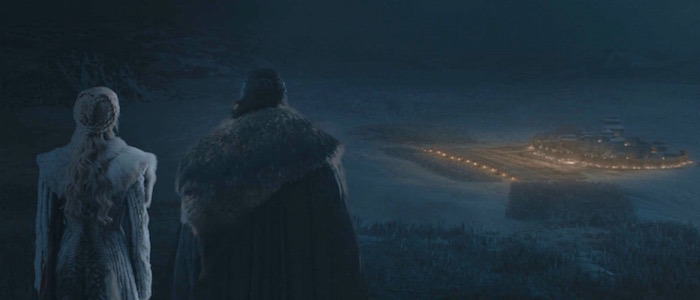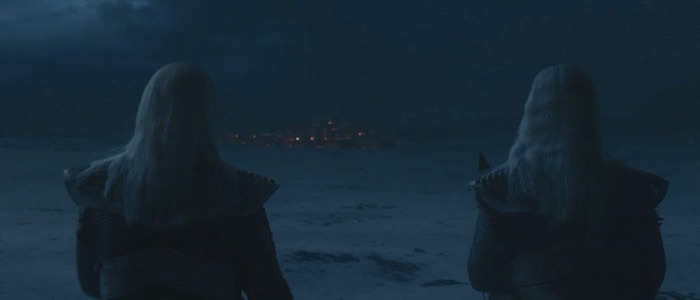The Battle Of Winterfell On 'Game Of Thrones' Was A Tactical Clusterf*ck – And A Military Officer Told Us Why
Whether you thought "The Long Night" was the best episode of Game of Thrones ever, hated it, or just couldn't see it, one thing was very clear: from a military standpoint, this was one of the most poorly planned battles of all time. The Dothraki charging blindly into the night. The grossly undisciplined commanders. The army of the living suffering losses on an enormous scale. It wasn't just because the Northerners and their allies were outnumbered. Without Stannis, Tywin, Robert Baratheon, and Robb Stark, the side of the living was run by somewhat novice leaders who have made it through battles because of luck and dragons.
While the dead had the obvious advantage, the living could have done a much better job of buying time and preserving their forces. To find out just where the living went wrong and what they should have done, I spoke with a military officer sporting nearly 15 years of wartime experience. He also happens to be a massive Game of Thrones fan. He broke down the five major missteps, and outlined what the living should have done to kill more wights, minimize the loss of life, and most importantly, not embarrass their ancestors with the worst-organized battle in Westerosi history.
Where is King Leonidas When You Need Him?
A common battle tactic that even a novice like me knows is that location is everything – knowing where to stand your ground can be the difference between victory and defeat. Whether you learned it from watching 300 or from the history books or from the battle of Helm's Deep in The Lord of the Rings, the idea of being able to force a massive army through a funnel and only fight a small force at a time seems like Battlefield Logic 101. However, this doesn't seem like a possibility for the poor souls of Winterfell. The Stark castle lacks the natural defenses of other strongholds such as the Vale, and the army of the dead are approaching across a massive open field, so clearly funneling was not an option when it comes to taking on the 100,000 wights. Right?
Wrong! According to my source, funneling or canalizing in this situation would be absolutely key, and where there aren't natural obstacles, you build them: "The trench should be the final obstacle before the castle, not the first one," my source told me, "And make it wider."
Theorizing that Jon and the gang had roughly three weeks to prepare for battle before getting word that death was at their doorstep, my source says that priority number one would be preparing the battlefield by laying out obstacles of spikes, sizable trenches, dragon glass, and fire. "I like what they did with the trench, but they needed more of it and much further out from the castle." He goes on to draw me a diagram depicting four different lines, consisting of three barriers in each line between Winterfell and the undead. The openings in each line of barriers are staggered from the one ahead, creating only small windows for the army of the dead to filter through where they would be, "met with a battalion of Unsullied."
The Cavalry is NOT a First Line of Defense
Clearly the brilliant minds at the Winterfell strategy table didn't read up on the Battle of Thermopylae, so they thought the best obstacle to stand between the army of the dead and Winterfell is the Dothraki horde, armed with flaming arakhs lit by the Lord of Light. The fiercest and most vicious fighters charge forward ready to fight! Our first line of defense! That can't be that terrible of a plan, right?
Super wrong! First and foremost, "the strength of mounted troops is in their speed and mobility, outmaneuvering dismounted forces to apply military might at the right time and place to achieve maximum effect on enemy forces." A fantastic display of a cavalry being utilized expertly was when Stannis attacked the Wildling army in the season 4 finale. Stannis flanks the Wildling army from both sides, passing through and trampling the enemy forces with great speed and strength, almost herding them to prevent Mance Rayder from pulling together any sort of adequate defense. The Dothraki were not only running full speed towards the enemies frontlines, they were doing so in the dark, having not seen what they are up against, and therefore wasting their renowned battle prowess.
The Dothraki are far too out-numbered to effectively flank the wights, but if the battle had been properly planned, and those aforementioned barrier lines put in place, the first thing you would want to do is, "use the Dothraki as mobile archers, providing supporting fire to the Unsullied battalions between the barriers." As the wights overwhelm the barriers, the Unsullied would retreat behind the next defensive line, and that is when the Dothraki would be able to charge, in all their screaming glory, and "flank the wights between the barrier lines." This maneuver would effectively buy time for the Unsullied to reform and prepare for the next wave. Then you would repeat this strategy for each section of obstacles. In doing this, the living could have saved thousands of ground troops, slowed down the army of wights, and saved the strength of some of the other, less skilled, ground forces for when the dead enter the castle walls.
Ranged Weapons? What are those?
One thing had me, a simple civilian, scratching my head as much as the waste of the Dothraki was the extremely limited and disorganized use of ranged weapons against the wights. The trebuchets that were only used a handful of times, the poor use of archers, no real plan for the dragons – the army of the living was practically inviting the dead to come knocking at their door.
Let's start with the trebuchets. A feat of ancient battle technology, trebuchets are those big things that sling giant rocks (or even wild fire), at the opposing forces. In the Battle of Winterfell, we saw these used briefly and ineffectively. Each of the dozen trebuchets flung a giant rock into the night, hoping to bowl over a fair amount of wights. It seems like a good idea that just didn't work out, so how could they have been utilized better? Well for starters, "leaving them exposed and defenseless outside the castle walls was an exceedingly poor choice." If done properly, the funneling of the wights through the obstacle belts and Unsullied battalions, would have created "layered kill zones," which the trebuchets could have been positioned to fire upon. Secondly, "It would have been more advantageous to use multiple, smaller projectiles with each trebuchet, dispersing over a larger area, eliminating more wights per volley." Basically, the living could have maximized loss of "life" on the other side, by spraying the incoming army with smaller, flaming rocks.
Next there are the archers. In my mind, the archers were doing exactly what they were supposed to be doing by firing from the openings of the castle walls, but I was soon corrected. According to my source, leaving the all of the archers in the battlements would only make them effective when the wights were practically at the doorsteps of Winterfell. "The use of mounted Dothraki archers in the field and dismounted Westerosi archers in range of the kill zones, behind subsequent obstacle belts, would have allowed for a flexible indirect fire capability which could react to changing conditions during the battle, shifting fire rapidly as called for by the ground commanders." In this scenario, the Westerosi archers would be able to stay out of direct combat while still adding defense to the first wave, before retreating and joining the rest of the archers in the battlements.
As for the Dothraki, we witnessed their incredibly impressive Commanche-style archery skills when Daenery's forces attacked the Lannister caravan returning from Highgarden in season 7. The benefit of this particular style of archery would leave the Dothraki, "still able to shift towards cavalry charges and envelopments once they run out of arrows but, considering their extensive training from childhood in mounted archery, it makes little to no sense to waste this capability." Long story short, the Dothraki charge continues to be the worst use of talent in Game of Thrones history.
Lastly, when it comes to ranged weapons, it is hard to beat solid air support. The idea that the only plan for the dragons was to wait nearby-ish in order to protect Bran and douse the Night King in dragon fire is yet another lousy call from a lousy commander ( more on that soon). This one really requires the least explanation because, frankly, it seems obvious. They have two dragons. This is supposed to the element that will help them beat the wights. The dragons are living, breathing, atom bombs capable of maneuvering back and forth spitting fire on the hordes of dead. Sure they needed a dragon set and ready to be able to take on the Night King when he took the bait, but they do realize they have two dragons, don't they?
Have Fun Storming the Castle!
The wights breaching the castle walls is an inevitability. Even if the battle was run by truly great military minds, all of the barricades, ranged weapons, and cavalry would only delay the inescapable end. One of the more shocking things to me about the Battle of Winterfell is that they seemingly didn't plan for this outcome. The defense within the castle walls really seemed like the absolute bare minimum, an afterthought (with the exception of the noble Lyanna Mormont, may she rest in power).
When discussing the lack of battle strategy within the castle walls with my source, it was clear that this was one of the more "WTF" aspects of their plan, or lack thereof. A castle is specifically designed to "be a fortified, defensible position." The strength of castle defense and its ability to slow the enemy is ever present in many battles, from the Battle of Blackwater in season 2 to the Battle of Helm's Deep. It is an opportunity for "the remaining archers to fire down upon them from interior walls or rooftops of buildings as well as dumping boiling pitch or oil below, which could then be set on fire." My source goes onto to suggest that, based on witnessing the wight attack Hardhome in season 5, Jon should have had the forethought to pour flammable material down the outside of the castle walls that could be lit on fire as the dead piled on top of each other to overtake the fortress.
One of the advantages that the living have inside the castle walls is knowing the layout. This would have been a great opportunity to reintroduce the idea of bottle-necking the enemy and picking them off in smaller numbers. "The buildings themselves should have been considered for the retrograde plan as the defenders fought back to predetermined final battle positions, ones with strong stone walls, limited entrances, and where possible, escape routes above or below ground which could be collapsed on pursuing wights," my source explained.
The show took us inside the castle as Arya ran through halls and found herself in not one but two large empty-ish rooms. Theoretically, windows and doorways could have been bricked off so that you could lure the wights in through one door, and put your back against the wall of the other near the only other exit. And since you should never underestimate your enemy, he would strongly recommend going ahead and adding flammable material and objects to these rooms, so that once it becomes too overwhelmed by wights, they would be able to set it on fire and make their exit. Imagine if Brienne, Jamie, and Podrick had used their ever present back-against-the-wall skills in that arena.
Take Me to Your Leader
None of this, not one single bit of this, matters when you don't have good leadership and communication. As my source explained:
"A crucial component of conducting any operation is establishing methods for command and control of your forces. While the defenders at Winterfell did at least assign command to each element of their formation, Brienne commanding the left flank, Jorah taking charge of the Dothraki, Grey Worm leading the Unsullied, they lacked a central command element which would oversee the entirety of the battle."
It turns out that Sansa was wrong. Tyrion would have been able to do more than die if he was outside of the crypt. Tyrion has already proven his ability to think on his feet in times of stress and chaos, which is a skill that was greatly missed at the Battle of Winterfell. With the two lead commanders waiting on the sidelines with dragons, and no central sub-commander on the battlefield, the armies protecting Winterfell were little more than small groups of people fighting next to each other instead of with each other. Tyrion would not be "leading the charge or engaging in fierce melee combat, but watching and directing from a high vantage point."
Ideally, Tyrion would be "communicating his commands to the sub-commanders of each element." Now, this requires two major changes and battle preparations that were not employed at that Battle of Winterfell. One of those is some form of communication. Obviously being in a world without radios and satellite phones, the command as a whole would have had to come up with some sort of code with torches, flags, fires, couriers, horns, or some other method, that would "indicate a change in plans or commencing from one phase of the operation to the next." While the snowstorm would have made some of this difficult, having a problem-solving mind like Tyrion on the field would have potentially led to identifying that Daenerys would not be able to see Davos' signal to light the trench, and a back-up plan could have initiated much sooner.
The second thing would be to not have your sub-commanders on the front lines. It may be a heroic idea, but they are statistically more likely to die first and if all of the leadership is killed in the first wave, the troops have no one to turn to. As my source explained: "They should have remained centralized or to the rear of their elements, so that they can monitor the progress of their troops, while also being positioned to receive orders from higher."
It doesn't help that there were no back up plans put in place, and the two lead commanders were the first ones to abandon the only plan they had. The wights individually might be brainless, but they are all controlled by one very powerful, very intelligent, and very ruthless mind. While they seem chaotic, they are quite possibly one of the most organized armies to ever exist. They operate fully as one. That is more than 100,000 soldiers working together in perfect unity.
Multiple people have seen the wights fight in action, Hardhome being the most important, and yet Arya seemed like the only person that was trying to gain intel and develop a strategy. There is absolutely no excuse for the lack of intelligence applied by the commanding forces to fighting this army. They have witnessed them dig under walls and doors, scale structures, and operate as a whole, they had all of the information that they needed and applied almost none of it:
"Their plan should have consisted of more than 'we will do X and if that fails, we will fight until we die'. There should have been branches and sequels, 'we want to do this, if successful, we move on to this, if that doesn't work, this is the next best thing we can do.' They also should have factored in the enemy's decision-making, how they would react to what friendly forces are doing."
Basically, drago glass and fire alone do not a battle strategy make.
Why Does it Matter?
Thanks to Arya initiating a back-up plan of her own, where none existed, the living still came out victorious, which will probably make all of these terrible choices and lack of leadership go completely unnoticed. Thanks, girl. But at what cost? The leaders of Winterfell put all of their dragon eggs in one basket, focusing solely on baiting the Night King, abandoning their soldiers in the process.
"Perhaps they had discussed the necessity of providing the dead with a ripe target which would fall quickly, to play on the previously displayed arrogance of the Night King and more surely draw him into the field," my source pondered."Their plan may have been designed to make their forces look like a dying beast, luring in the hunter for a final strike." However, based on Jon's track record in battle leadership, I really doubt that this was an idea born of intelligence and strategy. After all, he had to rescued by Littlefinger at the Battle of the Bastards.
We may have seen most of our favorite characters make it through the battle relatively unscathed, but now they are supposed to march south and face Cersei's massive army in the final war, and are once again going to be greatly outnumbered. A dwindling army following two of the worst commanders in the world are on their way to fight the only person in the Seven Kingdoms that could probably make the Night King shiver. Things are not looking good.

